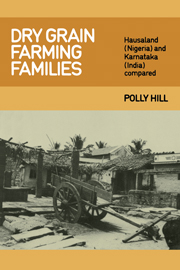Book contents
- Frontmatter
- Contents
- List of tables
- List of figures
- List of plates
- Preface
- Acknowledgments
- List of abbreviations and conventions
- Introductory Chapter: The Need to Engage in the Field Experience
- I Background Material: The Two Regions and the Eight Localities
- II A Dry Grain Agrarian Mode
- III The Village Farmland
- IV The Farming Household: (1) Joint Households
- V The Farming Household: (2) Miscellaneous Aspects
- VI The Essence of Inequality: Land Ownership
- VII The Diversity of Economic Activity
- VIII Intensification
- IX Upward and Downward Mobility
- X Migration
- XI Rural/Urban Relationships
- XII The Withdrawal from the Countryside
- XIII Agrestic Servitude
- XIV The Inevitable Dissolution of the Large Estates
- XV How did the Weakest Elements formerly Survive in the Anekal Villages?
- XVI The Lack of an Agrarian Hierarchy in Pre-colonial West Africa
- XVII A Dry Grain Mode: Some Conclusions
- List of references
- Index
Introductory Chapter: The Need to Engage in the Field Experience
Published online by Cambridge University Press: 05 June 2012
- Frontmatter
- Contents
- List of tables
- List of figures
- List of plates
- Preface
- Acknowledgments
- List of abbreviations and conventions
- Introductory Chapter: The Need to Engage in the Field Experience
- I Background Material: The Two Regions and the Eight Localities
- II A Dry Grain Agrarian Mode
- III The Village Farmland
- IV The Farming Household: (1) Joint Households
- V The Farming Household: (2) Miscellaneous Aspects
- VI The Essence of Inequality: Land Ownership
- VII The Diversity of Economic Activity
- VIII Intensification
- IX Upward and Downward Mobility
- X Migration
- XI Rural/Urban Relationships
- XII The Withdrawal from the Countryside
- XIII Agrestic Servitude
- XIV The Inevitable Dissolution of the Large Estates
- XV How did the Weakest Elements formerly Survive in the Anekal Villages?
- XVI The Lack of an Agrarian Hierarchy in Pre-colonial West Africa
- XVII A Dry Grain Mode: Some Conclusions
- List of references
- Index
Summary
As a fieldworker who has long studied agrarian systems and economic inequality in the tropical third world, more recently with particular reference to the causes of severe impoverishment, I have suffered much condescension since about 1970 owing both to my unfashionable methods of field enquiry and to my inability to formulate logically coherent conceptual systems of any general appeal. Now that I have widened my scope to include a district of south India (my earlier work for a period of fourteen years from 1953 had been confined to West Africa), I have ventured to write this book as a practical demonstration of the possibilities of formulating, on the basis of detailed fieldwork, a set of coherent hypotheses relating to a specific type of rural under-development which has recently come into existence in certain very densely populated dry grain zones in both West Africa and south India – as doubtless in certain other regions of these and other continents. There is a crying need for systematic categorisation of types of rural under-development in the tropical third world, and I hope that in identifying and analysing this particular ‘dry grain mode’ I shall have done something to encourage other fieldworkers to identify other modes.
The conditions associated with the existence of this dry grain mode are summarised at the beginning of Chapter II, which serves as an introduction to Chapters III to XI – the remaining chapters being historical.
- Type
- Chapter
- Information
- Dry Grain Farming FamiliesHausalund (Nigeria) and Karnataka (India) Compared, pp. 1 - 20Publisher: Cambridge University PressPrint publication year: 1982

